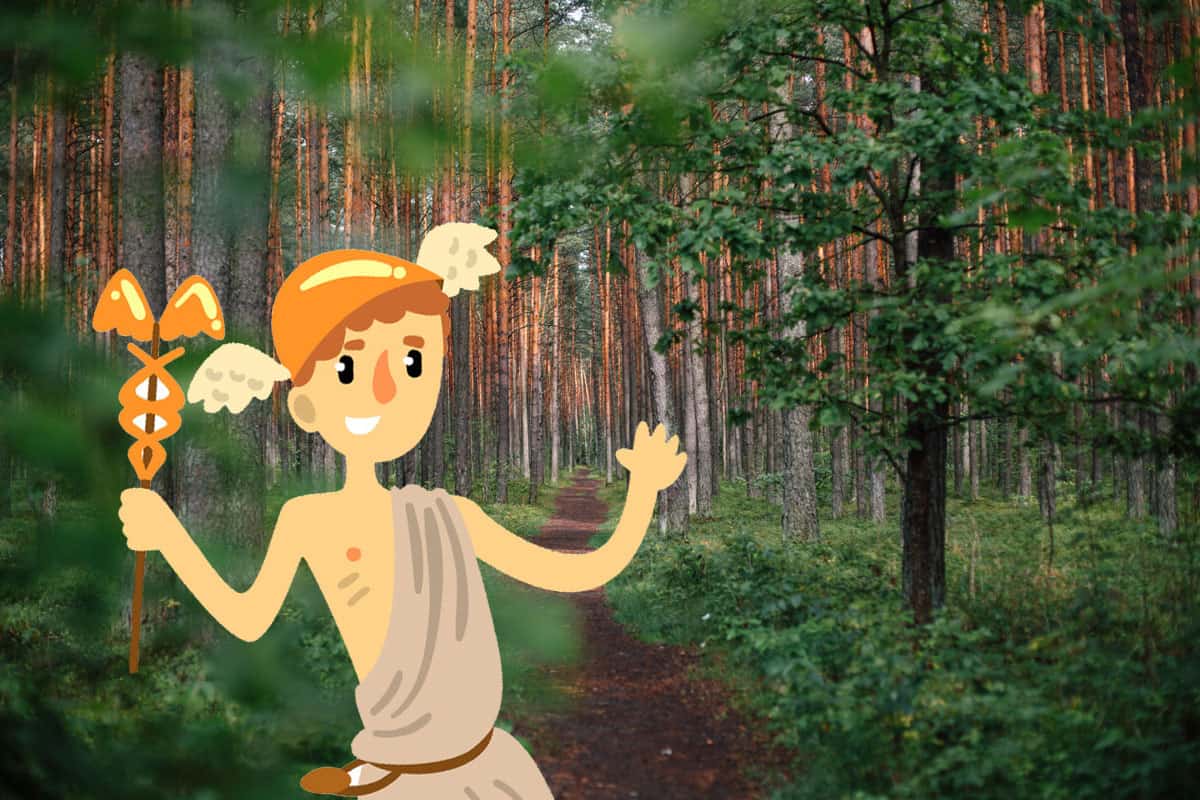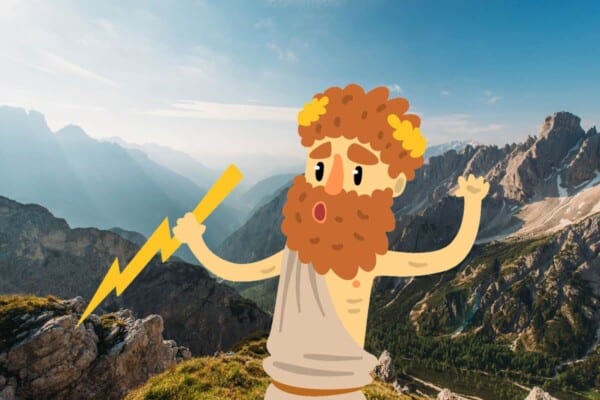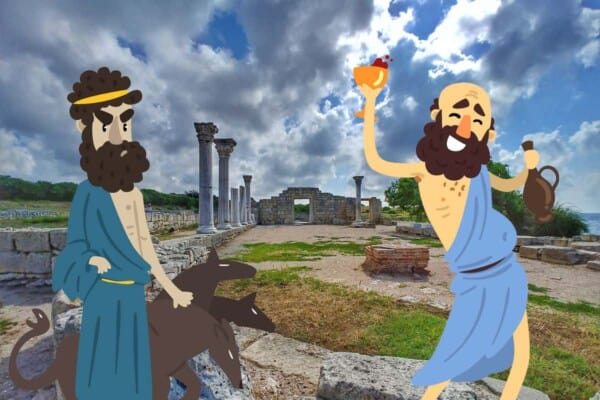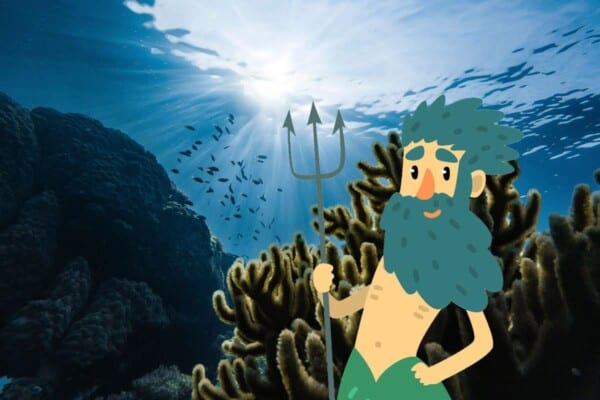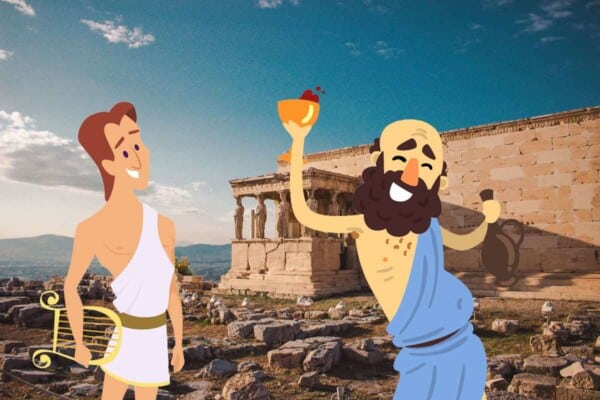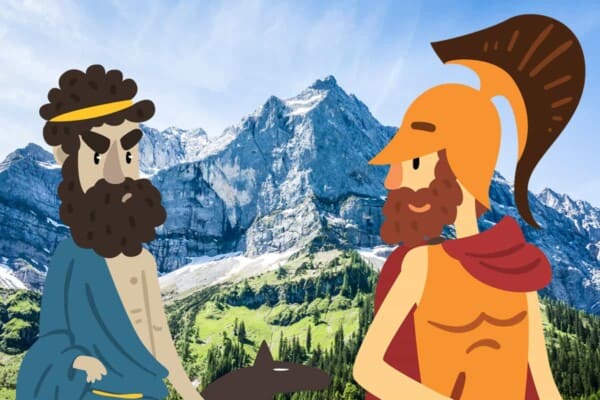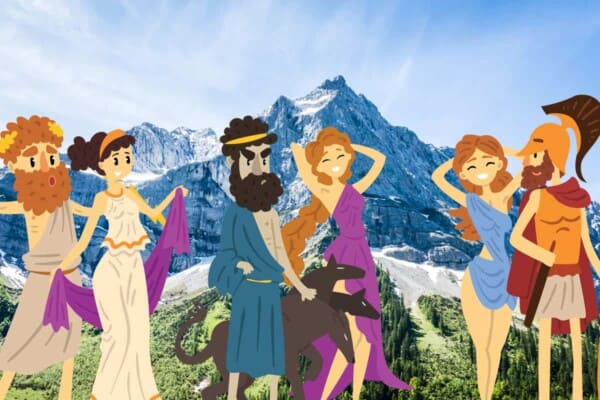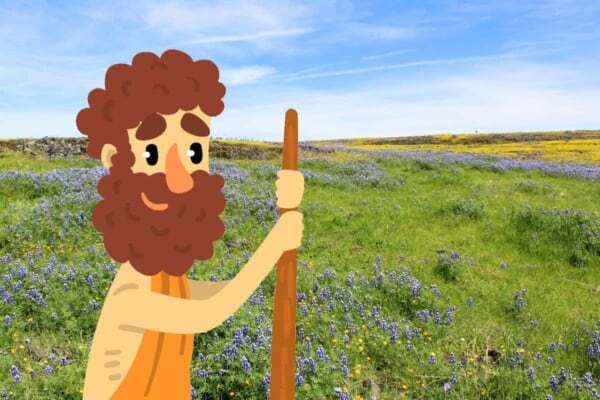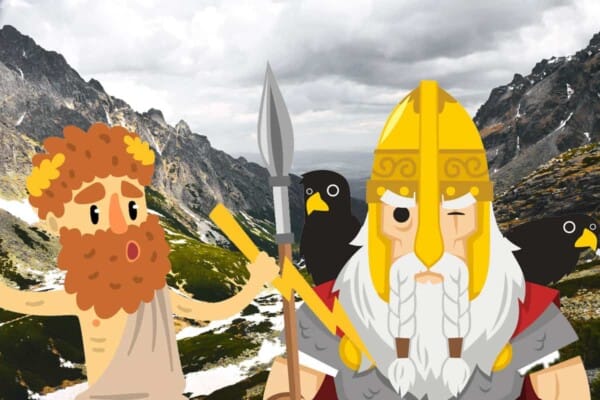Hermes, the trickster god. A master of persuasion and all round Olympic athlete. There are countless myths involving this interesting character. Be it his famed ability to play the lyre, his protectiveness of fellow travellers or his practical jokes played on the other gods. Hermes finds himself the centre of many a good story.
So without further ado, lets dive into some of those stories and myths, and find out a little more about Hermes.
Hermes Myths and Stories
1. The Birth of Hermes
The God Zeus would meet with the shy nymph Goddess Maia. Maia did what she could to not be in the presence of the gods, but, she was quite taken with Zeus. Together they would meet in a shadowy cave late at night. Their affair only took place while Zeus’ wife, Hera slept, and their union ended up producing Hermes.
Hermes was said to have been born in a Mount Cyllene cave located in Arcadia. He grew extremely fast, much faster than any normal child or god/goddess would. Almost minutes after his birth, he was capable of walking straight out of the cave. Once he wandered out of the cave, he came across a turtle and used its shell to create the first lyre. But, before it could be played, it needed strings.
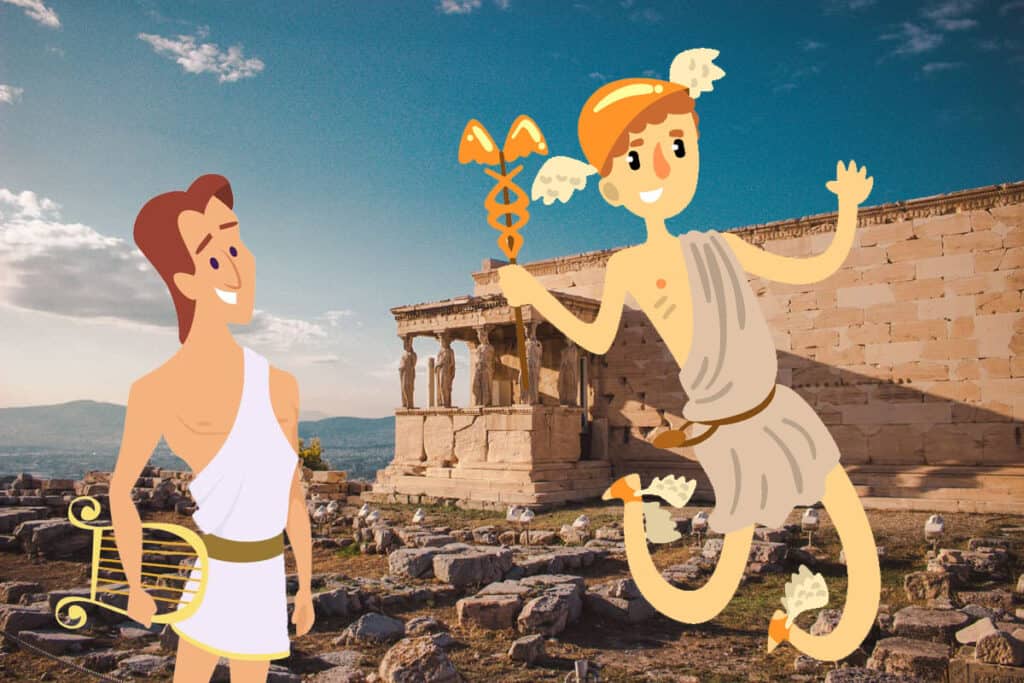
2. Stealing Apollo’s Cattle
After Hermes had used a turtle shell to create the first lyre, he realised the lyre needed strings. So, he set off to find some which led to him meeting the God Apollo.
To get strings for the lyre, Hermes stole cattle from Apollo. He made the cattle walk backward so Apollo would be thrown off, believing his cattle actually went the other way. Hermes then killed the cows and created strings from their guts. When Apollo discovered what happened he was furious. He brought Hermes to Zeus for punishment. But, Zeus found his son’s actions to be quite funny. Hermes then played the lyre for both his father and Apollo, and both gods were happily amused. Apollo even offered Hermes the rest of his cattle if he could take the lyre home with him.
3. The Inventor
Hermes had a very inquisitive personality. He was interested in many different things and if not entertained, he could get in trouble. He had been this way since the moment he was born.
Zeus was very taken with and amused by Hermes’ personality and antics. He decided Hermes would not just be a god, but one of the twelve supreme gods that ruled Olympus. Because of his tenacious and trouble-making qualities, Zeus decided the easiest way to keep him out of trouble would be to involve him in as many pursuits as possible.
Thus Hermes became the inventor of many things like the Greek alphabet, numbers, music, boxing, gymnastics, and astronomy. He was also known to be the messenger for Hades and would deliver messages to and from the Underworld, as well as perform other tasks that Zeus saw fit.
Hermes also shared his inventions and talents with mortals he took a particular interest in. He not only offered his protection but his knowledge as well.
4. The Argus Monster
The Argus monster was known to be a giant with many eyes. Hera used him to guard Zeus’ lover Io so the two would be unable to sleep together. Hermes was involved in the death of Argus.
Io and Zeus had an affair. Hera found out and was furious. To protect Io, Zeus turned her into a young cow so she could avoid Hera’s wrath. Hera, realizing what Zeus had done, took it upon herself to continuously sting Io so she wouldn’t be able to rest for even a moment. This also assured that Zeus and Io would be unable to lay together.
Hera also took it upon herself to put the giant, many-eyed monster Argus in charge of watching Io. In retaliation, Zeus sent Hermes to deal with Argus. Hermes played the monster beautiful lullabies using his flute. The monster eventually fell asleep and then Hermes beheaded it.
5. Helping Ares Escape
Ares was captured by two giant sons of the Greek god, Poseidon: Ephialtes and Otus. It was Hermes that came to his rescue and freed the Greek god.
Ephialtes and Otus grew at a phenomenal rate. By the time they were nine years old, they were said to be 36 feet tall. They were also known to cause trouble. One day they grew bored and decided it would be fun to capture the god of war, Ares, and keep him confined in a bronze jar. Ares ended up being locked away in this jar for over a year before Hermes discovered where he was and rescued him.
It is also thought that Ares may have been captured by the two giants when he tried to stop them from climbing up to Mount Olympus to storm the home of the gods. Either way, Hermes was the one who found Ares and set him free.
6. Heracles and Cerberus
Heracles had been sent to perform 12 labors in order to atone for the act of accidentally killing his wife and children. The 12th and final labor he had been sent to perform was capturing Cerberus, the three-headed guardian dog of the Underworld.
When Heracles was sent to retrieve Cerberus from the Underworld and bring him back to King Eurystheus, Hermes and Athena were the god and goddess who led Heracles down into the Underworld. They took him to the River Styx where he met Charon, the boatman. Charon took Heracles across the river where Heracles and the god of the Underworld, Hades, got into a fight.
Hades eventually told Heracles that if he could capture Cerberus without using any weapons, he could have him. Heracles ended up doing just that and took Cerberus back with him to Mycenae. But, Cerberus stay above ground wasn’t for long. He was eventually returned back to the Underworld to guard the passing of souls into the realm of the dead.
7. Take Souls from Earth to Hades
Hermes was known to be the messenger to the gods and the god who was responsible for guiding the souls of the deceased to the Underworld.
The god Apollo gave Hermes a special golden staff named the Caduceus. He then told Hermes to lay the staff over the eyes of those who were dying and show them the way to the Underworld. It was then, that when people would pass on, Hermes was there to guide them from earth to the River Styx. Once they made it to the river, they were then taken on a boat by Charon, the boat master, further into the Underworld.
Outside of being the messenger for the gods, Hermes was very close to mankind. Being the one who was responsible for guiding the deceased to their resting place was a role that matched up well with who Hermes ultimately was.
8. Hermes and Hera
Zeus’ wife Hera had a very bad reputation for being enraged and jealous of Zeus’ affairs. She would often be found tormenting his offspring or wrecking havoc on the lives of the women/goddesses Zeus would sleep with. Because Hermes was such a smart child, he figured out a way to get Hera to be an ally instead of an enemy.
When Hermes was just a small infant, he already knew it would be better to have Hera as an ally than an enemy. One day, he disguised himself as Ares, Hera’s son. When he crawled onto Hera’s lap, she had no idea the child was actually Hermes and ended up breastfeeding him. This act made her the foster mother of Hermes.
Being his foster mother, Hera had to treat Hermes as if he was her own son. She couldn’t torment him and bring grief to him as she did with Zeus’ son Heracles, or Zeus’ many lovers.
9. Hermes and Odysseus
After the Trojan war ended, Odysseus was on a ten-year journey to return to his home Ithica. On this journey, he came into contact with Hermes on two occasions, both of which helped him tremendously.
When Odysseus met Circe, the goddess-witch had turned his men into pigs. This was Circe’s plan, as she had taken a liking to Odysseus and wanted him to come to rescue his men. Odysseus would have been vulnerable to Circe’s spells if it had not been for his meeting with Hermes. Hermes gave Odysseus a special herb that would make sure Circe’s spells didn’t work on him.
It did the trick and Odysseus was able to save his men. The second meeting Odysseus had with Hermes was when Odysseus met the nymph Calypso. She fell madly in love with him and forced Odysseus to stay with her for seven years. Their time together came to an end with the god Zeus sent Hermes to tell Calypso she must let Odysseus go home.
10. Hermes and Perseus
Perseus was a demi-god whose parents were said to be Zeus and the Princes of Argive, Danae. He was known to be a great Greek champion and was most famous for beheading Medusa.
While Perseus traveled to find Medusa, he was told by a priest of Zeus that Perseus was under the protection of some very special gods. He happened to meet one of the gods while wandering along a country road. Meeting a handsome man with a golden staff embellished with wings on it, Perseus asked if they had met before. The man showed off a bit and floated in the air. Perseus then realized he was talking to the god, Hermes. Hermes warned Perseus that the task he was on was incredibly dangerous, but that it was indeed possible to complete. Hermes promised to show Perseus where the Gorgons lived.
He also gave Perseus a beautiful golden sword that would be able to cut through Medusa’s neck, a leather bag to carry the head in, a pair of special winged sandals that would allow Perseus to fly. Hermes then showed Perseus the way to the Gorgons so Perseus could continue his quest.
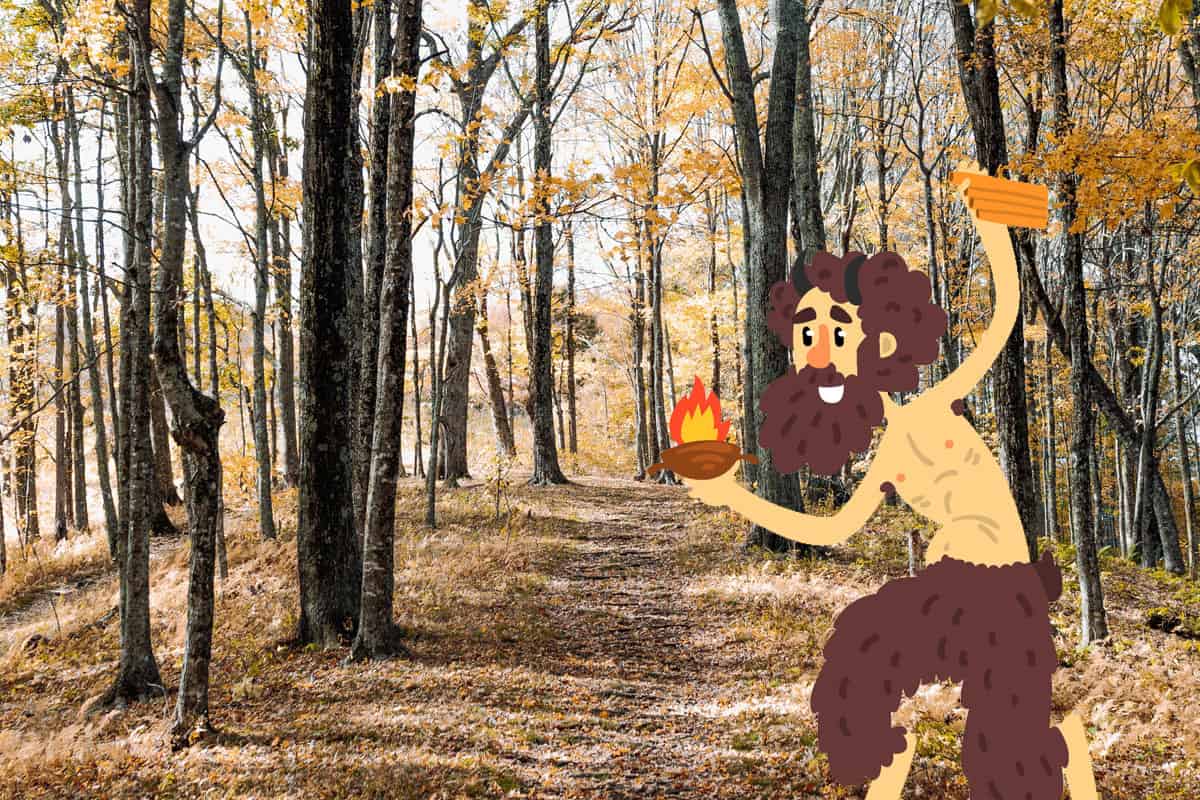
11. Hermes and Pan
Pan was said to be the son of Hermes and Penelope. He was the god of both shepherds and hunters, meadows, forests, and mountain wilds. He lived in Arcadia and would play panpipes while having fun chasing nymphs. He was a half-goat, half-man creature who is often found in stories alongside Dionysius.
Hermes always felt safe and accepted among humans. He would spend a significant amount of time with them, learning their ways, and sharing his knowledge. He also didn’t shy away from tending the sheep. It was at this time that he fell in love with the daughter of Dryops. They were married and she gave birth to his son, Pan.
They thought the goat-human child was fascinating and were ecstatic that he was now in their arms. Hermes took Pan in his arms and instantly fell in love. He brought Pan to show him off to the rest of the gods who were just as taken with the little creature as Hermes was himself. They all agreed the name Pan suited him, as he gave them much joy and happiness.
12. Hermes and Pandora
Pandora was known to be the first mortal woman who received gifts from all the gods. Hermes was among those gods, and his gift would have consequences.
While all the other gods were giving Pandora gifts like the breath of life, a beautiful singing voice, or skills for spinning and weaving, Hermes took a different approach. Saving his gift for last, he presented Pandora with a magnificent golden box. He told her she could never open the box because it contained a mystery that no one should ever know about. This box gave Pandora curiosity. This became a huge problem, as Pandora could not stop thinking about what as in the box.
One day, she couldn’t take it any longer and opened the box. Hundreds of ferocious and ugly creatures were released from it. They were known to be the things that plague man to this day – disease, crime, poverty, and more. Pandora quickly shut the box which trapped one remaining creature inside. The creature foreboding never made it out. Because foreboding stayed safely locked away, mankind never knew what troubles they would face. They could get through each day, even the hard ones, with hope.
Final Thoughts
So that is a breakdown of the Greek god Hermes. He is thought of as one of the more fair and reasonable gods. He was able to help a lot of characters throughout the stories and Greek myths. If on occasion he was to be found getting up to some trickery or another then it was very often done in jest and with good intention.
If you have an comments or criticisms of the content then we would love to hear your input in the comments sections below. Thanks for taking the time to read this article.

